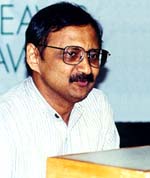PRESS RELEASE OF 22th
April 2000
Embargoed: Do not release before April 22, 2000
Environmentalists Anil Agarwal of
India and Earth Day Founder Denis Hayes of the USA win the GEF’s Year 2000 Global
Environment Leadership Award
Washington, D.C. Earth Day, April 22, 2000—Mohamed T. El-Ashry,
Chief Executive Officer and Chairman of the Global Environment Facility (GEF), announced
today that Anil Agarwal, Director of the Centre for Science and Environment in India, and
Denis Hayes, who initiated Earth Day in 1970, are winners of the Year 2000 Global
Environment Leadership Award.
The annual award recognizes an individual group, or organization in government, the
private sector, or the non-government arena, for leadership of significant national and/or
international actions over a sustained period to protect the global environment. It was
first presented by the GEF in 1998 to President Jose Maria Figueres of Costa Rica, and
jointly in 1999 to Professor Bolin and Ambassador Bo Kjellen of Sweden.
In paying tribute to the two awardees, Dr El-Ashry said: "For the last three
decades the contributions made by both Anil Agarwal and Denis Hayes to environmental
education and awareness at the international, national and local levels have been truly
outstanding."
"Anil Agarwal’s career as an environmental journalist, environment advocate
and analyst, prolific author of the environment, chair of the world’s largest network
of environmental organizations, and director of the Centre for Science and Environment has
made him a major influence in environmental policy making both in India and
internationally," he continued.
"I am particularly pleased to make this announcement on Earth Day, which Denis
Hayes organized in the United States in 1970 with the involvement of over 20 million
people," Dr El-Ashry said.
The selection of Anil Agarwal and Denis Hayes for the Year 2000 award was made by Dr
El-Ashry on the advice of a panel of seven prominent international environmentalists after
an open nomination process.
Resume: Anil Agarwal
 Anil Agarwal is renowned for his role in spreading the message
in India and abroad about the importance of the environment in poor, developing countries.
He has consistently argued in his writings that there is a deep relationship between
poverty and environment. The poor and their environment are so intrinsically linked that
any development process that is destructive of the environment will inevitably destroy
livelihoods and create unemployment. Anil Agarwal is renowned for his role in spreading the message
in India and abroad about the importance of the environment in poor, developing countries.
He has consistently argued in his writings that there is a deep relationship between
poverty and environment. The poor and their environment are so intrinsically linked that
any development process that is destructive of the environment will inevitably destroy
livelihoods and create unemployment.
Agarwal, a mechanical engineer by training, began his journalistic career as science
correspondent for the Hindustan Times in 1973. He has since written for the London-based
journalists Earthscan and New Scientist.
In 1980, Agarwal founded the Centre for Science and Environment (CSE), one of the
world’s most dynamic NGOs, to examine the relationship between environment and
development and raise public consciousness about the need for sustainable development. In
1982, Anil Agarwal conceptualized and edited the first citizens’ report on the state
of India’s environment. Published by CSE, the report provided the social rationale
for India to take environmental concerns into account, helped India’s civil society
to see the importance of environmental and natural resource issues, and spurred the growth
of NGO environmental action. It slowly helped to resolve the debate on environment versus
development by promoting the concept of sustainable development widely known from the
Brundtland Commission report.
From 1983 to 1987, Agarwal chaired the world’s largest network of environmental
NGOs, the Nairobi-based Environment Liaison Centre. In 1987, the United Nations
Environment Programme elected him to its Global 500 Honor Roll for his work in the
national and international arena. The Indian Government has also honored him for his work
in environment and development.
In 1991, Agarwal co-authored the book "Global Warming in the Unequal World"
which had a considerable impact on the negotiations leading up to the Framework Convention
on Climate Change. His position that the global ecological framework should be built on
principles of democracy, justice and equality for all the world’s citizens influenced
considerable the Rio Conference in 1992. Since Rio he has continued to advocate the need
for the South’s participation in creating the rules of global governance.
In 1999, his book "Green Politics: Global Environmental Negotiations"
provided for the first time a developing country analysis of environmental treaties and
negotiations. Most recently, he was a member of the World Commission on Water where he
advocated the issue of community rights and participation.
 |